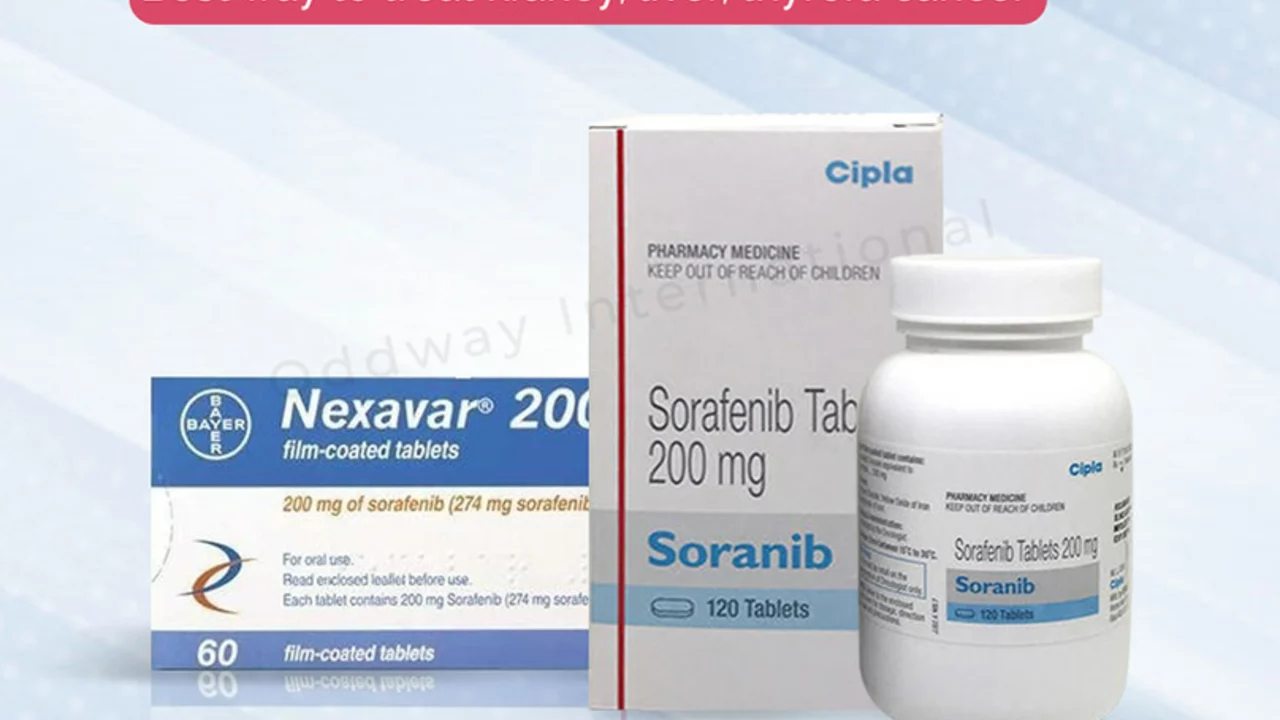Benefits of Sorafenib: What it Does and who might benefit
Sorafenib is a pill many doctors choose for certain advanced cancers. It’s not a cure, but it can slow tumor growth, shrink some tumors, and extend survival in patients with liver, kidney, or thyroid cancer. Want the practical facts? Read on — I’ll keep it simple and useful.
How sorafenib works
Sorafenib is a targeted cancer drug called a multi-kinase inhibitor. That means it blocks signals cancer cells use to grow and it cuts off the blood supply tumors need (angiogenesis). By hitting several pathways—like RAF kinases and VEGF receptors—sorafenib can reduce tumor activity and slow progression.
Main benefits people see
Here are the real, everyday benefits patients report or doctors expect:
- Slows disease progression: For many with advanced hepatocellular carcinoma (HCC), renal cell carcinoma (RCC), or radioactive iodine‑refractory thyroid cancer, sorafenib delays tumor growth.
- Can extend survival: Clinical trials showed survival gains in some groups—meaning more time with stable or controlled disease.
- Tumor shrinkage in some cases: Not everyone shrinks, but some patients do see measurable tumor reduction that can ease symptoms.
- Symptom relief: Shrinking or slowing tumors can reduce pain, bleeding, or pressure symptoms depending on tumor location.
- Oral dosing: It’s a pill (usually 400 mg twice daily), so treatment is often easier than frequent IV infusions.
Sorafenib’s benefits are most notable when surgery isn’t an option or when other treatments failed. Your doctor will weigh tumor type, liver and kidney function, and overall fitness before starting it.
What to watch for and practical tips
Common side effects include hand‑foot skin reactions, diarrhea, fatigue, high blood pressure, and rash. Liver tests and blood pressure checks are routine while on treatment. Speak up early about skin or gut issues — dose changes or breaks often help without losing benefit.
Drug interactions matter. Sorafenib is handled by liver enzymes, so some other medicines can change its levels. Avoid grapefruit and tell your doctor about herbal supplements, antifungals, certain antibiotics, and blood thinners.
Useful tips: take the pill at consistent times (follow your doctor’s guidance about food), report side effects quickly, and keep scheduled blood tests. If you’re managing high blood pressure or chronic liver disease, extra monitoring is likely.
Sorafenib isn’t right for everyone, but for many people with advanced liver, kidney, or thyroid cancers it offers meaningful control and more time. Ask your oncologist how it compares to other targeted or immunotherapies for your specific case.
- Colin Hurd
- Jun, 26 2023
- 20 Comments
The breakthrough cancer treatment: Exploring the benefits of sorafenib
I recently came across an incredible breakthrough in cancer treatment involving a drug called sorafenib. This targeted therapy has shown promising results in treating various types of cancers, including liver and kidney cancer. Sorafenib works by blocking the growth of cancer cells and cutting off their blood supply, effectively slowing down or stopping tumor growth. The benefits of this treatment include fewer side effects compared to traditional chemotherapy and the potential for improved survival rates. I can't wait to see how further research and development of sorafenib will continue to revolutionize cancer treatment for patients worldwide.

